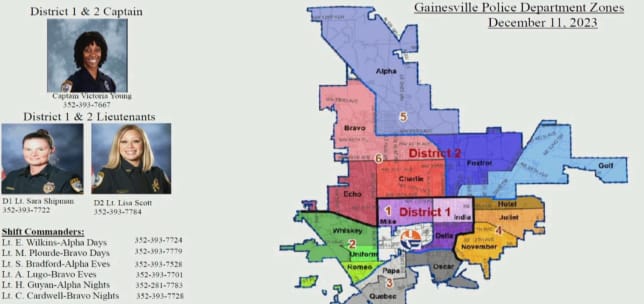GRU Authority Discusses Gainesville City Referendum & Hears Accusations of Public Records Request Refusal
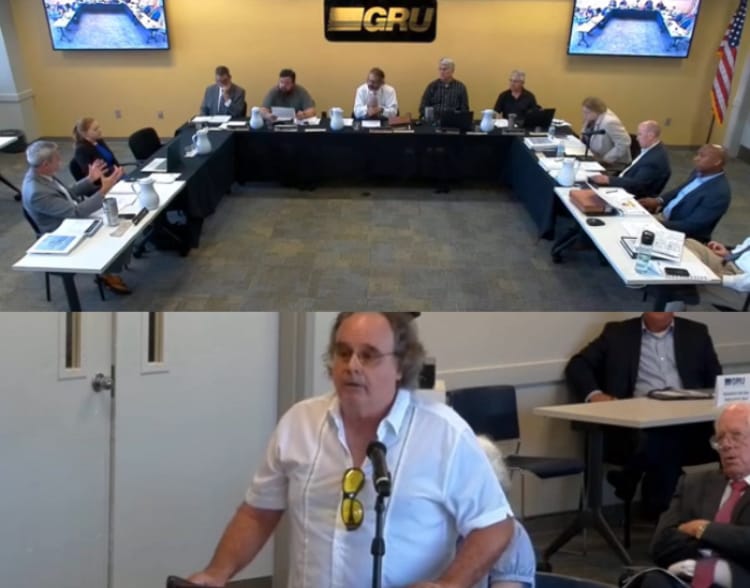
Updated June 7 | A paragraph was added giving further clarification to a public commenter’s quote.
Updated June 6 | The GRU Authority meeting which was cancelled yesterday has been rescheduled for Monday.
Updated June 5 | The GRU Authority meeting scheduled for today has been cancelled.
Editors Notes | The General Funds Transfer’s (GFT) terminology was changed last year to the Government Services Contribution (GSC). The terms are generally used synonymously at GRU Authority meetings and refer to the same transfer. The transfer has been referred to as the GFT in this article for simplicity.
On Wednesday, May 29, the Gainesville Regional Utilities (GRU) Authority discussed the proposed GRU budget for fiscal year 2025. During public comment the board heard accusations of public record's request refusal against GRU management. The recent referendum that was passed by the City of Gainesville, which would allow city residents to vote on whether they want the GRU Authority in place, was a significant topic of discussion.
During chair comments, Chair Ed Bielarski gave an infographic presentation on his thoughts going into the meeting. Bielarski alluded to the possibility of reducing or eliminating the general funds transfer (GFT) in order to reduce GRU’s $1.7 billion debt. He showed a chart that compares the amount of general funds transferred from GRU to the City of Gainesville compared to utilities in other cities. Bielarski said, “In this slide, I took the six-year totals of the big five municipal utilities in Florida…. You look at GRU, and it's 150%. For every [$1.00] over the past six years, GRU has given [$1.50]. That's something we really have to talk about in the budget.”
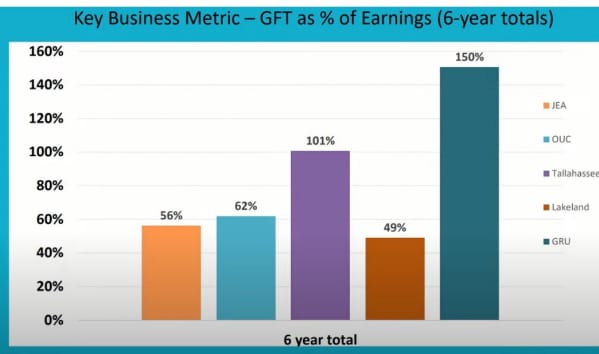
The board moved on to discuss a recent referendum that was passed by the city of Gainesville, which would allow residents to vote on whether they want to remove Section 7 of the Gainesville city charter, which establishes the authority. The move has caused legal controversy, as Florida House Bill 1645 mandates the GRU Authority's existence.
Chair Bielarski announced that Attorney at Law Ray Washinton is representing a group of GRU customers who live outside of the City of Gainesville in a lawsuit against the City of Gainesville. The plaintiffs allege the city’s referendum is unconstitutional because the city doesn’t have the authority to change the governance of GRU and that it would result in their unequal treatment.
Member Carter made a motion to direct the GRU attorney to send a letter to the supervisors of elections office asking to keep the referendum off the ballot. Carter said, “How can they put something on the ballot that is directly in conflict with the law.” Carter’s motion was seconded by Vice-Chair David Haslam.
Before voting on the motion, the board heard public comments. Local realtor and former city commission candidate Jim Konish gave his argument as to why the city’s referendum is unjust. “I’d like to read you the Florida Constitution that you have sworn to honor, defend, and uphold…. ‘Municipalities may be established or abolished and their charters amended pursuant to general or special law.’ House Bill 1645 is both a local law and a special law. [The City of Gainesville] has home-rule unless otherwise provided by law. The state can, and in fact has preempted the local home-rule over any matter…. They’ve done it expressly, and they’ve done it unambiguously. The City of Gainesville cannot repeal a state statute by calling for an illegal referendum.”
Alachua County Labor Coalition coordinator Dr. Bobby Mermer gave his argument for why the referendum is just. “I don’t think there's a single person that was part of the effort to put this on the ballot that would’ve opposed allowing [GRU customers living in unincorporated Alachua County] to vote on the matter as well. Many members of this coalition are residents of the unincorporated Alachua County who are also GRU customers. The legislature, [House Bill 1645], would’ve been able to allow them to vote on it along with city residents, [and] we asked them to do that in 2023. They said, ‘No, no compromises whatsoever on 1645.’ The City Commission cannot allow non-residents to vote on the matter, so that is an unfortunate thing that the state legislature denied to both city residents and GRU customers who live in unincorporated Alachua County. Second, we have several legal analyses that say that the city commission can put this on the ballot. The state legislature could’ve amended the charter to further prohibit the city commission from putting the charter referendum on the ballot, but they didn’t. They could have also expressly said that the voters can't directly interfere with the authority, but they chose not to do that…. Please vote no on this motion and allow the people who own this utility, city residents, to have our say.”
Following up, East Gainesville resident Armando Grundy-Gomes pointed to the density of GRU customers living outside of Gainesville before disparaging the consistent deliberation of lawsuits and legislation. “A third of ratepayers are outside of the city boundaries. Those are facts…. It's not about who is right here. It's about how we move forward together. The problem is not gonna suffice, whether it's this bill or this lawsuit…. Is it about you being right? Or is it about doing what's right for everybody?”
President of the League of Women Voters of Alachua County, Janice Garry, spoke against the way in which House Bill 1645 was passed and called on the authority to hold themselves to a higher degree of accountability. “In 2018, this was put before the voters in a referendum to have a third-party authority manage the utility, and it was defeated…. In 2023, the legislature bypassed the voters and took the question starghit to the legislature. There was no public input, [and] it was called a local bill, but there was no local governance involvement. They forced it through in a very rapid manner…. The people who live outside Gainesville and use GRU services do not have input into what is going on with this authority. This authority has no accountability to the public. It has no accountability to the city. It has no accountability to the county. It only has accountability to the governor. I would challenge any GRU customer inside or outside of city limits to have a communication with the governor about any GRU issue…. We are trying to live in a democracy and the state overreach into our city charter does not represent democracy.”
Bielarski responded to Garry’s comments directly, saying, “Maybe [you] want to live in a democracy, but we do actually have a representative republic. I’ve heard that so many times. I just think it's important to understand that you elect people to represent yourself. Absolute democracy is the height of tyranny and chaos.”
GRU ratepayer Angela Casteel, who lives in Alachua County, said she deserves a vote based on GRU’s own motto. “Right outside here, GRU states that it's owned by the people it serves. Therefore, I am served by GRU, and yes, I should get a vote.”
Casteel clarified after the meeting that she doesn’t support the referendum being passed in the first place, but if it is, than she would deserve a vote.
The board moved on to pass the motion unanimously. Before the motion passed, it was amended to allow Bielarski to approve the letter before the next board meeting for time efficiency.
During general public comment, Konish disclosed that he, along with Vice-Chair James Coats of the previous GRU Authority’s iteration and former Member Robert Karow, had been stood up after making public records requests regarding a discrepancy in GRU’s financial statements. “My friend James Coats came into this arena and put in a lot of work [and] spent a lot of money. [He was] slimed, threatened, [and] harassed. [Within] a few weeks, he discovered service level agreement losses that dwarfed what the auditor general found after three years of inquiry. You know, sir, that the service level agreement losses are probably greater than the GFT and constitute an indirect GFT [which is] not reflected on your financial statements. [i.e.] not calculated into the flow of funds. This represents a fraud on all these creditors to whom you owe all these billions. You have a duty to deal with the systematic falsification of cost allocation reports that was proven by Mr. Coats…. I asked for an accounting of how much of a direct and indirect transfer was paid in 2023, and I was told that would cost $1,400. Coats and Karow made numerous requests for information that were ignored. I have numerous public records requests that are ignored. When you falsify an official record, and people rely on it, sir, that's a very serious matter.”
Grundy-Gomes took to the stand to call attention to the seriousness of matters regarding public records requests while calling out racism in the system in which public records are requested. “I would ask you, Mr. Chair, to your attorney, if [GRU general manager (GM)] Tony Cunningham or the leadership team is getting public records requests and they’re just going into file 13 or not being answered. That’s a concern. I don’t know if that's true, [but] it is a question [and] a concern. It wouldn't be the first time a government entity has done that…. I wanna go back to something that I wanted to talk about when I had some questions. I remember the look I got from the GM at that time…. We were talking about the integrated resource plan (IRP). I had several questions, and it was almost a look of, ‘Why are you asking these questions? How do you know these questions?’ Welp [I] read budgets all the time [and] look at them. In spite of what some people say, not all people that look like me are dumb.”
Casteel brought attention to the debilitating human impacts resulting from GRU’s financial situation. “Back four years ago, my family had been homeless. We were placed in an apartment by Supportive Services for Veteran Families (SSVF). At that point, we were able to start rebuilding our lives…. In the summer of 2022, it became so hot that my neighbors were struggling to pay their bills. My neighbor downstairs [is] elderly, [and] she was literally leaving her door open. Her bill was over $500…. Yes, I looked for ways to try and see what could be done…. I asked for help with the legislative delegation members, and I don’t think any of these groups have come out to any of our places. I encourage you guys to go and talk to the ratepayers outside the city.”
After public comment, the board heard GM comments from Cunningham. Vice-Chair Haslam outwardly asked Cunningham about Konish’s previous accusations. “I'm on board with Mr. Konish here; he says you’re moving money around that the board doesn't know about. You have anything to say on that? Is [Konish] wrong?”
Cunningham denied Konish’s allegations. “It’s not accurate. We have not moved any money around.”
Haslam responded, “So the $1.8 million he was talking about? He misspoke or doesn't know what he's talking about?”
Cunningham did not have an answer and looked to his colleagues to help him find one. “I’m not sure I know. Does anybody know what that is [referring] to. I don’t know what that's in reference to.”
After more deliberation, Cunningham said, “The only thing I could think it was in connection is when we were talking about the Connect Free program…. We brought that to the previous board to ask if we could stop that going forward. The board voted to stop that…. So starting October 1, 2024 [Fiscal Year 2025], we will no longer be collecting a surcharge on connection charges and providing that to the city for the Connect Free program. That was the action taken by the board.”
Member Carter called the action a “direct pass-through,” saying, “That was something we collected for the city, no gain to the utility [so] we took the black eye. Sort of like garbage.”
The board agreed to hold a special meeting later this month to discuss the issues further and better understand where each other’s heads are at.
Cunningham passed around a memo written by Public Financial Management (PFM) to GRU’s financial advisor. It states the city’s referendum passing poses a risk to the impression of the utility to rating agencies. He summarizes that another change in governance could put GRU at risk of a downgrade of $28 million.
The board moved on to unanimously pass a motion that would refund 2014 utility system revenue bonds. GRU’s finance manager, Mark Benton, said it would save GRU approximately $13 million.
Over the next two hours, Cunningham and GRU staff gave a presentation on GRU’s budget. The item was informational, and no motions were made. Cunningham said he wants to stabilize electric rates and reduce overall GRU bills before reminding the board that they are mandated by state law to establish a budget by the end of the month. He clarified that the language of the law indicates that the budget only needs to be submitted by July 1 and that it can be updated.
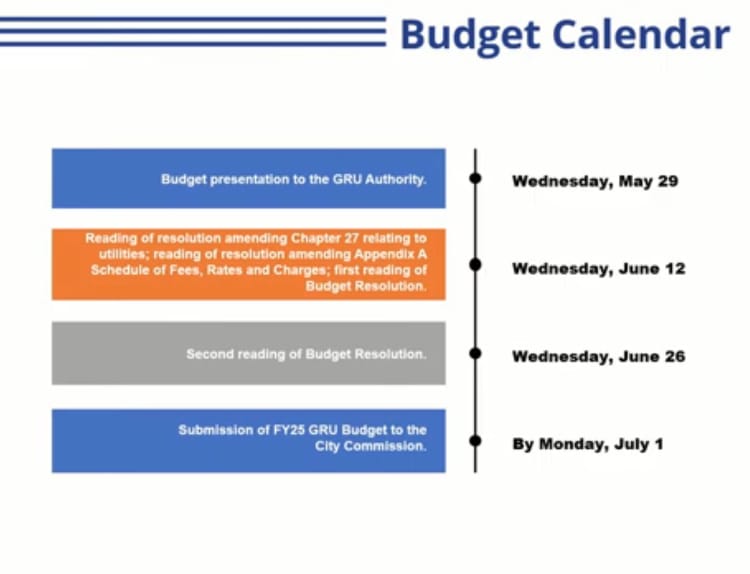
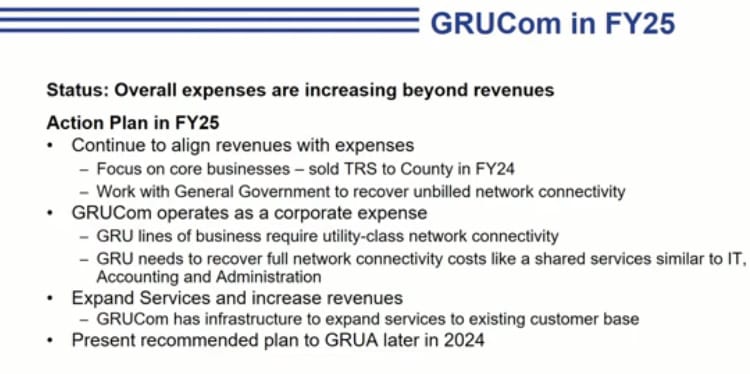
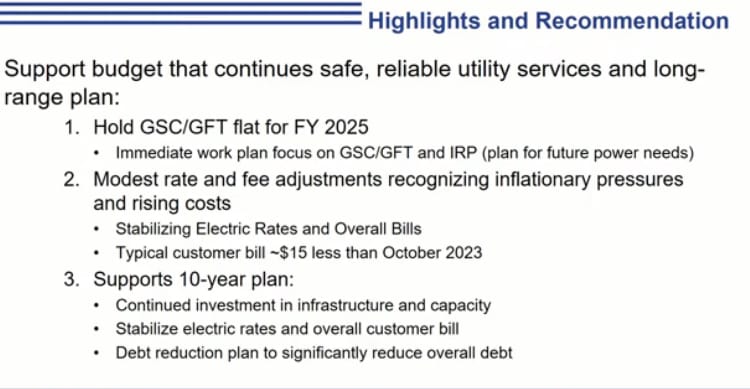
The board will meet again tomorrow to discuss the fiscal year 2025 budget further at 5:30 pm at the GRU headquarters building (301 SE 4th Ave).
The meeting has been rescheduled for Monday.




